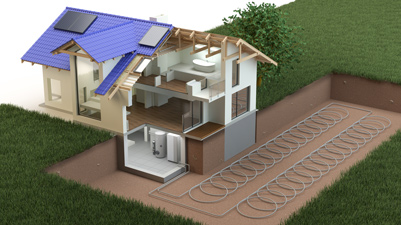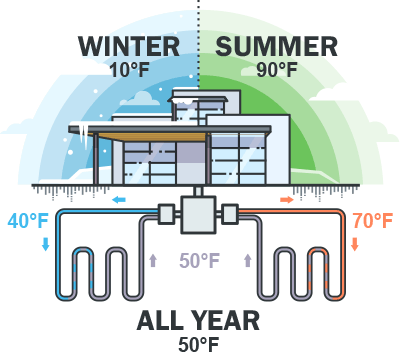Ground-Source Heat Pump Systems
 Ground-source heat pumps (GSHPs), also called “geothermal” heat pumps, are a type of heat pump that exchanges heat between a building and the ground or groundwater by circulating heat transfer fluid between indoor equipment and an outdoor loop. (This is not to be confused with “geothermal electricity generation,” which uses steam from hot, moist rocks beneath the surface.)
Ground-source heat pumps (GSHPs), also called “geothermal” heat pumps, are a type of heat pump that exchanges heat between a building and the ground or groundwater by circulating heat transfer fluid between indoor equipment and an outdoor loop. (This is not to be confused with “geothermal electricity generation,” which uses steam from hot, moist rocks beneath the surface.)
Like all heat pumps, GSHPs can reverse their refrigeration cycles to provide both heating and cooling. All ground-source heat pumps are “cold climate” heat pumps, as their efficiencies are not impacted by the temperature of the outside air.
If you have questions about GSHPs and our available rebates, contact BED Energy Services.
Check out this Geothermal Ground Loop FAQ from Dandelion Energy.
Burlington 2030 District Webinar
On Thursday, April 11, 2024, the Burlington 2030 District and Burlington Electric Department (BED) hosted this educational event featuring geothermal specialist George Martin (President, LN Consulting), members of the BED Energy Services Team, and Holly Francis (Sustainability Coordinator at Champlain College).
Benefits
Ground source heat pump (GSHP) systems can provide you with:
- Lower and more predictable annual energy bills,
- Resilient and reliable comfort and efficient energy performance year-round,
- Emissions-free heating and cooling for low environmental impact,
- A low maintenance, long-term solution for space conditioning needs.
GSHP systems require no fossil fuel backup, because they can handle 100% of the heating and cooling load of a building year-round, when sized properly. GSHPs are the most effective way for building owners to strategically electrify their heating and cooling systems while drastically reducing their carbon footprint.
Ground-source heat pumps are the most energy-efficient heat pump solution and have the lowest operating costs of any heat pump type. In many cases, ground source heat pumps are twice as efficient as air-source heat pumps.
 GSHPs shine when compared to ASHPs operating in heating mode in extremely cold winter weather. This is due to the fact that heat is being exchanged with the ground, which stays at around 45 – 50°F year-round, rather than the outside air, whose temperature fluctuates widely and drops below zero for weeks in Vermont. In heating mode, a GSHP system’s heating efficiency remains similar to its cooling mode efficiency, since loop temperatures do not vary by much.
GSHPs shine when compared to ASHPs operating in heating mode in extremely cold winter weather. This is due to the fact that heat is being exchanged with the ground, which stays at around 45 – 50°F year-round, rather than the outside air, whose temperature fluctuates widely and drops below zero for weeks in Vermont. In heating mode, a GSHP system’s heating efficiency remains similar to its cooling mode efficiency, since loop temperatures do not vary by much.
GSHPs are also extremely efficient air conditioners, as they use the cool ground as a heat sink while air source heat pumps must battle the hot and humid summer weather. GSHPs will always provide a higher EER and lower peak demand per unit of cooling energy delivered when compared to ASHPs.
GSHP systems have the added benefit of offering low-cost integration of domestic hot water heating, which means a healthier environment and lower energy intensity can be achieved.
GSHP systems are durable and have long system lifetimes, because they require no outdoor equipment. Underground piping and wells require no maintenance and can last for 50 – 75 years. Indoor GSHP equipment can last 25 years or more. Refer to manufacturer’s manuals for specific preventative maintenance tasks for equipment.
Groundwater quality will impact maintenance schedule of submersible well pumps.
To improve the comfort of your home or business, and save money, contact the BED Energy Services team to get started with free, unbiased advice. We’ll walk you through the decision-making process and help you maximize your energy investments.
Energy Savings Calculator
Check out your potential savings using a calculator provided to us courtesy of WaterFurnace.
Actual savings can vary considerably for any customer depending on a wide number of variables including:
- Current costs per gallon of propane or oil.
- The type of fuel you’d be replacing:
- GSHP systems provides substantial savings over propane gas at current and past prices.
- GSHP systems provides great savings over oil at current and past prices.
- GSHP systems provide can provide savings over natural gas at current and past prices.
- The combustion efficiency of your current heating system (a range of about 65 to 95%).
- Extent of building weatherization. All types of heat pumps perform better in tighter and well insulated buildings.
- Whether the GSHP system displaces a less efficient air conditioning (AC) system, which may result in cooling savings.
- Whether GSHP provides AC where none was present, thereby increasing costs.
Designing and Installing Ground Source Heat Pump Systems
Please visit our GSHP loops page to learn more about the design approaches and installation recommendations for GSHP systems.
Rebates
The BED Energy Services team can help you with financial rebates and technical assistance for choosing and installing ground-source heat pump systems of any size.
Rebate amounts are calculated on a customer basis. Contact us to begin the process.
Designers and installers working with customers on ground-source heat pump systems of any size must complete a preliminary technical analysis before applying. To receive rebates, the qualified designer must complete the design, and involve BED in design review. To receive rebates, qualified contractors must complete the drilling, loop field installations, and the final installation. Rebates are provided upon completion of installation, after a BED field inspection.
Your project must be located in Burlington, Vermont. You must design and install your project according to the requirements of the Vermont Commercial Building Energy Code.
When you’re ready to get started, give us a call so we can discuss your project and estimate your potential financial rebates.
